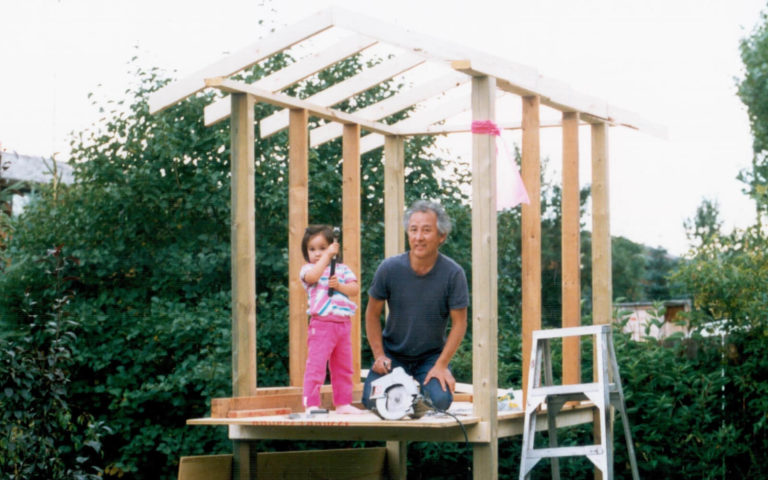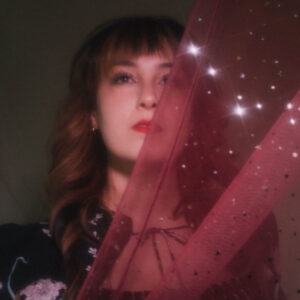By Leslie Ken Chu
The rock stalwarts lean into vulnerability and nuance, proving that evolution doesn’t have to mean softening the blow.

Clea Anaïs has already made a name for herself as a talented artist and multi-instrumentalist, best known for her work in indie pop bands RALEIGH, Woodpigeon, Reuben & the Dark, and Astral Swans. With her upcoming debut solo album, Circle Zero, she centres her own experiences and stories, exploring nuanced and difficult themes of loss, depression, grief and relationships (to her father, to her ex-partners, to herself).
The lead single ahead of the album’s release on March 25, “Stars Still Dying,” is a heartfelt letter to her father after he passed away. Visceral lyrics float above the shimmering, expectant arrangement, Anaïs’ voice searching and soaring into the heavens. We caught up with her to discuss her path towards releasing new music as a solo artist, as well as her relationship to her father throughout her life.
[The interview has been edited for clarity and length.]

Clea Anaïs
You describe “Stars Still Dying” as a “love letter from me to my father after he passed away.” What was your relationship to your father like? How did his passing change that relationship?
To be honest, it was a complex relationship, largely because of the circumstances we lived in. I was his fifth, and youngest daughter, and so our relationship was built within the constructs, needs, and behaviour of the rest of our family members. My home was not a particularly happy home, or positive environment growing up. There was a large age difference between us, generationally, and my father was an immigrant to Canada who spoke English as a second language. He faced a lot of challenges in Canada veiled as microaggressions. There were juxtapositions between my world as a young, first generation Canadian, and his Mauritian Asian Catholic upbringing. Anne Koizumi, an NFB filmmaker, really sums up some of these cultural and generational challenges beautifully in her short animated film, In the Shadow of the Pines.
My father and I however, both worked to foster a positive and caring relationship with each other. We made space to do fun things together. He loved action films and we would go watch them together. I have great memories of camping with him as a child, and visiting his home island of Mauritius. I have peaceful memories of just the two of us.
He died of pancreatic cancer two weeks after he went into emergency; he never left the hospital. During this time he thanked me for taking care of him, he reminded me that I was young and had time left to explore life and figure things out. This reassurance was a gift for me. I slept alongside him in the hospital and learned that sound is one of the last senses you lose: when it became hard for him to express much, he could still hold my hand while I played him music, or sounds from tropical islands like the one where he was born.
The single’s chorus reflects on the ephemeral nature of, as you put it, “life’s richness” juxtaposed with a sense of universal, infinite vastness. How did you approach these feelings when writing “Stars Still Dying”
It was as far as we had dreamed
The garden grew deep the incense rising
Lifted as heat to stars still dying
Gone just like magic by the morning
In Western ways of thinking, time and space are often conceptualized as linear, but this chorus really plays on expanding what a moment can mean.
The first line talks about a shared journey ending, but then in the second sentence you tap into the idea that a memoryscape can be as vast and lush as you desire. Memories and dreams are one place I still connect with my father, and that universe is infinite.
At my father’s funeral, everyone had the chance to take Chinese incense to burn for him. I went on a long walk that night to the tip of Prince’s Island Park and burnt my incense for him by the river, while watching the moon rise and the sun set. The imagery of the smoke rising up to the stars as they gradually became brighter in the darkening sky was poignant for me. I liked the idea that even after those stars disappear in the morning, there is the knowledge they are still burning brightly, and will continue to burn far longer than I will exist.
You worked closely alongside filmmaker Brock Jorgensen on the music video. How do you feel the video expands and elevates certain moods and emotions in the song?
I always had very clear imagery tied to the lyrics. Lines like, “the first breath is arresting,” double for the shock of finding out my father was so ill, but also provide an allegory for how abrupt our entry into life is as a baby. The lyrics start at the beginning of the journey of life, and the song arrives at its end with the experience of loss and relinquishing life.
In shooting, I was able to convey the moments I had envisioned. The second verse was about the growing feeling of distance between me and my father at the hospital. Because of COVID, we had to alter the location to a bedroom, but the sentiment of helplessness and distance was maintained. Brock Jorgensen is extremely talented and professional as a videographer, but one of his best qualities as a co-creator was his receptiveness: he was open to listening to me empathetically, then absorbing those sentiments and capturing his own version of them visually.
You’re about to release your debut solo album, Circle Zero, but you’ve previously been active in several bands, including RALEIGH, Woodpigeon, Reuben & the Dark, and Astral Swans, among others. What did you hope to accomplish with the album?
It was really pivotal for me to undertake this record, simply to affirm that I could do it alone. Brock Geiger, my co-creator in RALEIGH, and I went through a challenging time in which it was best to step back from that project. In creating Circle Zero (a title that alludes to pondering one’s basic truths), I was striving to find my own voice again and to prove to myself that I could function artistically on my own terms.
The songs on the record are very personal in nature, because that time in my life was exceptionally hard. I was able to write about gaslighting, about loss, depression, death — also nurturing joy, because that was what my journey was at that time. I am really happy with the record. It could have never seen the light of day and I would be glad I was able to complete the project because it is my own. It was also a process that reminded me of how inextricably tied I am to the amazing community of musicians and creators who I work with in Calgary and beyond. I have an unreal extended team, and I am very grateful that it still includes Brock Geiger today.
By Leslie Ken Chu
The rock stalwarts lean into vulnerability and nuance, proving that evolution doesn’t have to mean softening the blow.
By Cam Delisle
The pop veteran beamed into Rogers Arena Tuesday night with a glitchy arsenal of remixed hits—some faring better than others in her AI-styled end-of-the-world fantasia.
By Alexia Bréard-Anderson
Montréal’s premier gathering for electronic music and digital creativity returns with an immersive three-act program bridging AI, XR, Indigenous tech, and ecological imagination.